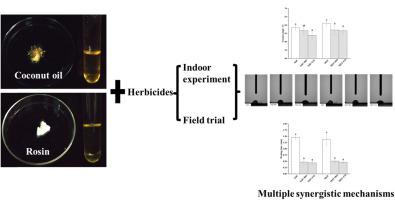Ecotoxicology and Environmental Safety ( IF 6.2 ) Pub Date : 2021-09-09 , DOI: 10.1016/j.ecoenv.2021.112766 Shujie Ma 1 , Ran Jia 2 , Luwei Liu 2 , Ziping Zhu 3 , Xin Qiao 2 , Wei Zhang 2 , Lihui Zhang 1 , Jingao Dong 1

|
Natural adjuvants are novel options to reduce the doses of chemical herbicides. The aim of the current study was to examine the compositions and adjuvant effects of rosin and coconut oil on herbicides using a combination of indoor experiment and field trial. The GC-MS results showed that the main component of rosin was abietic acid (40.02%), and the main components of coconut oil were 2-pentanone, 4-hydroxy-4-methyl- (21.45%) and dodecanoic acid (14.59%). In greenhouse experiment, rosin showed a significant adjuvant effect on nicosulfuron against Digitaria sanguinalis and Amaranthus retroflexus, with the GR50 ratios of 1.47 and 1.69, respectively. The GR50 values of nicosulfuron in the present of coconut oil were 3.99 and 10.13 g a.i./hm2 against D. sanguinalis and A. retroflexus, lower than that of individual application. The adjuvant effect of rosin and coconut oil on mesotrione was also found. In field trial, the fresh weight control efficiency of nicosulfuron (45 g a.i./hm2) and mesotrione (112.5 g a.i./hm2) was significantly improved after the addition of rosin and coconut oil, similar with that of recommended dose. Rosin and coconut oil could reduce the contact angle of nicosulfuron, with the results of 56.68° and 53.90°, respectively, lower than that of individual application. Furthermore, rosin and coconut oil could decrease the surface tension, wetting and penetration time; and increase the spreading diameter and maximum retention. Both rosin and coconut oil have adjuvant effects on herbicides in the lab & field with multiple mechanisms. Thus, they have the potential to be developed into natural adjuvants for herbicide formulation to control weeds.
中文翻译:

松香和椰子油对烟嘧磺隆和甲基磺草酮防治杂草的辅助作用
天然助剂是减少化学除草剂剂量的新选择。本研究的目的是结合室内试验和田间试验,研究松香和椰子油的成分和助剂对除草剂的影响。GC-MS结果表明松香的主要成分为松香酸(40.02%),椰子油的主要成分为2-戊酮、4-羟基-4-甲基-(21.45%)和十二烷酸(14.59%) )。在温室试验中,松香对烟嘧磺隆有显着的佐剂作用,对血洋地黄和反枝苋有显着的辅助作用,GR 50比分别为1.47和1.69。GR 50椰子油中烟嘧磺隆对血红线虫和反曲霉的作用分别为3.99和10.13 g ai/hm 2,低于单独施用时的值。还发现了松香和椰子油对甲基磺草酮的佐剂作用。在田间试验中,烟嘧磺隆(45 g ai/hm 2)和甲基磺草酮(112.5 g ai/hm 2)的鲜重控制效率)加入松香和椰子油后显着改善,与推荐剂量相似。松香和椰子油可以降低烟嘧磺隆的接触角,分别为56.68°和53.90°,低于单独施用的结果。此外,松香和椰子油可以降低表面张力、润湿和渗透时间;并增加铺展直径和最大保持力。松香和椰子油都对实验室和田间的除草剂具有多种作用机制。因此,它们有可能被开发成用于控制杂草的除草剂制剂的天然佐剂。











































 京公网安备 11010802027423号
京公网安备 11010802027423号